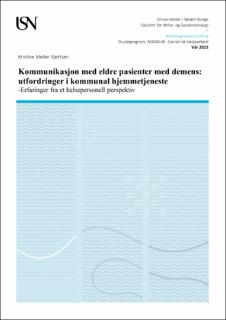| dc.contributor.advisor | Heyn, Lena Günterberg | |
| dc.contributor.author | Gjertsen, Kristine Meder | |
| dc.date.accessioned | 2023-07-22T16:42:08Z | |
| dc.date.available | 2023-07-22T16:42:08Z | |
| dc.date.issued | 2023 | |
| dc.identifier | no.usn:wiseflow:6842104:54648925 | |
| dc.identifier.uri | https://hdl.handle.net/11250/3080962 | |
| dc.description.abstract | Denne studien bygger på intervjuer med tre ulike grupper helsepersonell som har nær kontakt med eldre personer diagnostisert med demens. De tre gruppene som inkluderes i studien er assistenter, helsefagarbeidere og sykepleiere. Målet med studien var å undersøke og beskrive erfaringene til disse gruppene når det gjelder kommunikasjon med eldre pasienter med demens innenfor rammen av kommunal hjemmetjeneste.
Problemstilling: «Hvordan opplever helsepersonell i kommunal hjemmetjeneste kommunikasjon med eldre pasienter med demens?».
Mål og hensikt: Målet med studien er å beskrive ulike sider av hvordan helsepersonell i hjemmetjenesten opplever kommunikasjon med eldre personer med demens.
Hensikten er å utvikle kunnskap som styrker hjemmetjenestens fokus på kommunikasjon, som dermed bidrar til at ansatte gir eldre med demens best mulig pleie og omsorg i eget hjem.
Metode: Det anvendes en kvalitativ forskningsmetode hvor empirien er samlet inn gjennom fokusgruppeintervjuer. I analyseprosessen er Malteruds fire stegs analyseprosess benyttet.
Resultater: Resultatene viser at de tre gruppene helsepersonell har ulik mestring og opplevelse av kommunikasjon med eldre pasienter med demens. Assistentene rapporterte at de følte seg usikre og manglet tilstrekkelig opplæring og kompetanse når det gjaldt diagnosen demens. Dette hadde konsekvenser for deres kommunikasjon med pasientgruppen, og de måtte lære av sine egne erfaringer. Sykepleierne på sin side uttrykte at de hadde kunnskap om ulike metoder som var viktige i kommunikasjonen med eldre pasienter med demens, men at tidspress og høy arbeidsbelastning hindret dem i å anvende disse metodene i tilstrekkelig grad. Helsefagarbeiderne opplevde mye av det samme som sykepleierne, men nevnte ikke de samme utfordringene knyttet til tid. Alle gruppene var enige i at fokus på kommunikasjon som ferdighet kunne bli bedre innad i virksomheten.
Konklusjon: De tre gruppene som ble intervjuet opplever varierende utfordringer knyttet til kommunikasjon med eldre pasienter med demens. Det er et ønske om å ha økt fokus på kommunikasjon som en ferdighet for å styrke den enkeltes kompetanse. For å sikre at kommunikasjonen fungerer godt er det viktig å tilby tilstrekkelig opplæring og kompetanse, spesielt for ufaglærte assistenter som kan ha begrenset kunnskap om demens. Sykepleierne opplever tidspress og økt arbeidsmengde som den største utfordringen når det gjelder å anvende sin eksisterende kunnskap. Dette resulterer i at eldre pasienter med demens ofte blir nedprioritert. Kunnskapen som er blitt avdekket i studien, er viktig og kan på ulike måter bidra til å styrke fokuset på kommunikasjon med eldre pasienter med demens innenfor hjemmetjenesten. Dette kan føre til bedre pleie og omsorg for denne pasientgruppen i sitt eget hjem.
Nøkkelord: Demens, kommunikasjon, helsepersonellperspektiv, hjemmetjeneste | |
| dc.description.abstract | This study is based on interviews with three distinct groups of healthcare personnel who have close interactions with elderly individuals diagnosed with dementia. The three groups included in this study are assistants, healthcare assistants, and nurses. The aim of the study was to investigate and describe the experiences of these groups in terms of communication with elderly patients with dementia within the context of municipal home care services.
Research question: "How do healthcare personnel in community-based home care services experience communication with elderly patients with dementia?"
Aim and purpose: The aim of the study is to describe various aspects of how healthcare personnel in home care services experience communication with elderly persons with dementia. The purpose is to develop knowledge that strengthens the home care service's focus on communication, thereby contributing to employees providing elderly patients with dementia with the best possible care and support in their own homes.
Method: The study has a qualitative research method where the empirical data is collected through focus group interviews. Inductive analysis was used in the analytical process, and Malterud's four-step analytical process was employed.
Results: The results indicate that the three groups of healthcare professionals have different levels of proficiency and experience when it comes to communication with older patients with dementia. The assistants reported feeling uncertain and lacking sufficient training and expertise in relation to the diagnosis of dementia. This had consequences for their communication with the patient group, and they had to learn from their own experiences. The nurses, on the other hand, expressed that they had knowledge of various methods that were important in communicating with older patients with dementia, but time constraints and high workloads prevented them from adequately applying these methods. The healthcare assistants experienced many of the same challenges as the nurses, but did not mention the same challenges related to time. All groups agreed that there could be better focus on communication as a skill within the organization.
Conclusion: The three groups of healthcare professionals interviewed reported varying challenges in communicating with elderly patients diagnosed with dementia. There is a desire to increase focus on communication as a skill to strengthen individual competence. To ensure effective communication, it is important to offer sufficient training and expertise, especially for unskilled assistants who may have limited knowledge of dementia. Nurses experience time constraints and increased workload as the biggest challenge in applying their existing knowledge, resulting in elderly patients with dementia being often deprioritized.
The knowledge uncovered in the study is significant and can contribute in various ways to strengthen the focus on communication with elderly patients with dementia within home care services. This can lead to better care and support for this patient group in their own homes.
Keywords: Dementia, communication, health personnel perspective, home care | |
| dc.language | nob | |
| dc.publisher | University of South-Eastern Norway | |
| dc.title | Kommunikasjon med eldre pasienter med demens: utfordringer i kommunal hjemmetjeneste -Erfaringer fra et helsepersonell perspektiv | |
| dc.type | Master thesis | |







